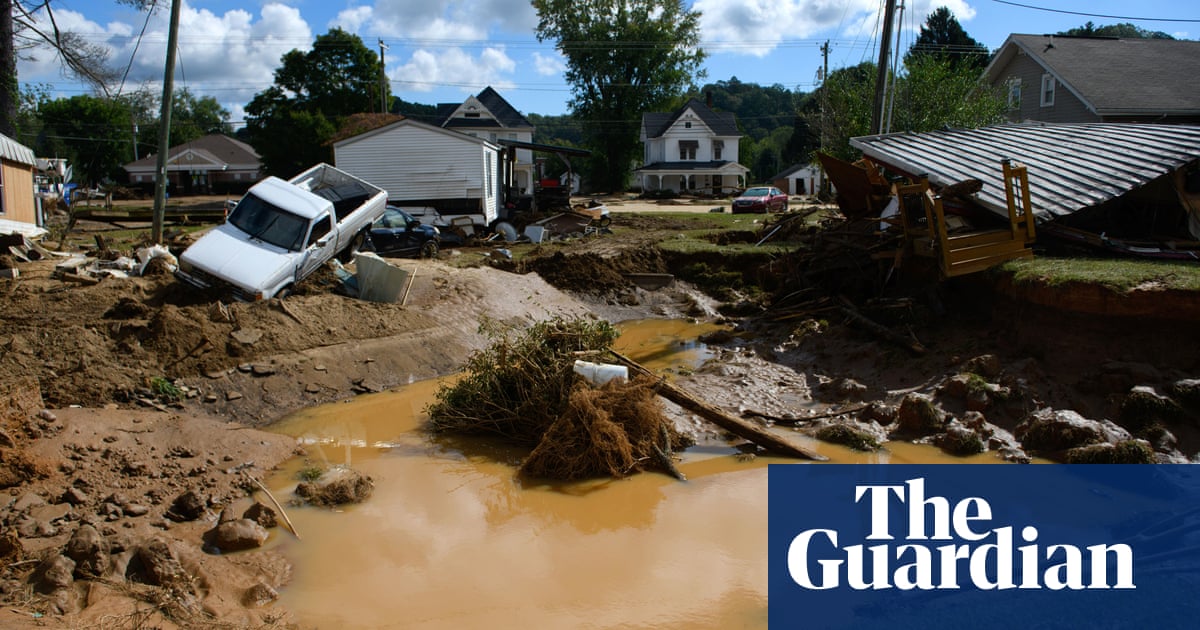As the south-east US continues recovery efforts after Hurricane Helene’s devastation, the storm’s death toll keeps climbing, with at least 90 killed across several states.
More than 1 million Americans are also still without power in the Carolinas and Georgia.
Helene made landfall last Thursday night in Florida’s Big Bend region as a category 4 hurricane. And even though it weakened to a tropical storm before moving through Georgia, the Carolinas and Tennessee, the storm’s winds, rainfall, storm surge and flooding destroyed entire communities in its path.
As of Monday morning, the Associated Press was reporting that at least 90 people had been killed across several states as a result of the storm. Thirty of those deaths were being reported from the city of Asheville, in western North Carolina, which was left isolated on Saturday by damaged roads and a lack of power and phone service amid a deluge inflicted by Helene.
Officials in Buncombe county – which includes Asheville – also said over the weekend that they had received about 600 missing persons reports through an online form. Rescue missions remained ongoing there on Monday.
On Sunday, North Carolina’s department of public safety said that supplies such as food, water and other needs were arriving in Asheville. The state’s national guard was airlifting supplies into counties across western North Carolina, too, officials said.
“This is an unprecedented tragedy that requires an unprecedented response,” Roy Cooper, North Carolina’s governor, said.
Over the weekend, more than 500 national guard soldiers helped conduct more than 100 rescue operations in western North Carolina, officials there said. At least 119 North Carolina residents and their pets were rescued.
Cooper has said that the death toll in North Carolina toll may rise as rescuers and other emergency workers reach other isolated and devastated areas. More than 50 search teams are spread throughout the region in search of stranded people, he said.
He has urged residents in western North Carolina to avoid travel, largely so the roads can be clear for emergency crews.
All roads in western North Carolina are currently considered closed, and non-emergency travel is prohibited, according to the state’s transportation department website.
On Monday morning, Cooper appeared on CNN and said that hundreds of roads had been destroyed – and that entire communities had been “wiped off the map”.
“We have to make sure that we get in there and are smart about rebuilding and doing it in a resilient way,” he said. “But right now we’re concentrating on saving lives and getting supplies to people who desperately need them.
“A lot of communities are completely cut off. And by the way, rivers are still rising, so the danger is not over, the flooding is likely not over.”
The University of North Carolina-Asheville said over the weekend that due to the storm’s damage, classes would be suspended until 9 October. The school said that parts of the campus were inaccessible and described “significant tree damage”.
“Cell and internet coverage is nonexistent at this point,” the school also said on Saturday, adding that they were providing security, food, water and comfort to the students who remain on campus.
According to the Associated Press, the storm unleashed the worst flooding in a century in North Carolina.
On Sunday on CBS News, the Federal Emergency Management Agency (Fema) administrator, Deanne Criswell, described the flooding in North Carolina as “historic”, adding: “I don’t know that anybody could be fully prepared for the amount of flooding and landslides that they are experiencing right now.
“We’re sending more search-and-rescue teams in there,” Criswell said.
As of Monday morning, more than 700,000 homes in South Carolina were without power – including more than 500,000 in Georgia and 400,000 in North Carolina, according to Poweroutage.us.
In Florida’s Tampa Bay region, the death toll as a result of the hurricane reached nine people on Sunday. All deaths took place in a mandatory evacuation zone, county officials in Pinellas county said.
In Augusta, Georgia, which suffered widespread damage due to the storm, officials are urging residents to limit water use to “essential drinking only for the next 24-48 hours” – a temporary effort to help with the recovery of the area’s water supply.
State officials in South Carolina have announced 25 storm-related deaths in the state so far, according to the Post and Courier, and many residents in South Carolina remain without power.
The National Weather Service office of Greenville-Spartanburg, South Carolina, described the storm over the weekend as the “worst event in our office’s history” in a post on Facebook addressed to the residents of western North Carolina and north-east Georgia.
“We are devastated by the horrific flooding and widespread wind damage that was caused by Hurricane Helene across our forecast area,” the post reads. “There are no words to express our sorrow at the loss of life and incredible impacts to property.”
The American Red Cross announced that it had opened or supported more than 140 shelters across the US for nearly 9,400 people driven out of their homes by the storm.
And AccuWeather is estimating that Hurricane Helene inflicted between $145bn and $160bn in property damage and economic losses.
Joe Biden has said that he would visit the areas affected by Helene this week, as long as it does not disrupt rescue and recovery operations.
The president has pledged federal assistance to help with recovery efforts – and said that his administration is giving states “everything we have” to help with their response to the storm.
Kamala Harris reportedly will also be visiting the areas struck by Helene this week, and so will Harris’s opponent in the 5 November election, Donald Trump.












